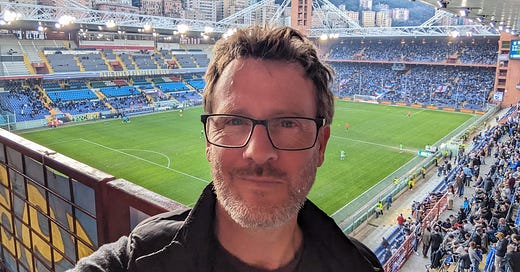We don’t have a road that goes to our house. We live on a rather steep hill above the eastern edge of Genoa, and the only way to and from our house is via a creuza that seems best suited to mule transport. It is steep and narrow and rocky. Because bits of it had crumbled away to almost nothing somebody thought to fix it with some freshly applied concrete. Within hours somebody else had thought to write Doria Merda in it before the concrete had set.
Doria Merda is shorthand for “I am a supporter of Genoa CFC, eternal footballing rivals of Sampdoria, and I wish them nothing but an association with excrement.”
I was going to write this post linking Italian military spending with dirty beaches, but that can wait. Tomorrow a football match will take place that will force half of this port city to hold its collective breath. My father-in-law looks like he’ll have a heart attack whenever he mentions it. If Sampdoria lose to Salernitana they will face a disastrous (and potentially fatal) drop into Serie C for the first time in their history. Whoever it was that wrote Doria Merda will no doubt be watching on with glee.
There’s something special about cities that nurture a true footballing rivalry, and Genoa is no exception. The Derby della Lanterna pits Genoa Cricket and Football Club (the oldest continuing club in Italy, set up by the British in the 19th century) against Sampdoria, a club that had its apogee in those glorious years around 1990 when Italy’s football league was the strongest in the world.
Earlier this season Sampdoria, languishing in the second division, somehow beat their Serie A rivals Genoa CFC in the cup. But the Derby della Lanterna was the only bright spot in a dreadful season, that comes after years of financial and footballing mismanagement. If they go down to Serie C there is a threat that malaise might turn into a death spiral.
This would be a tragedy. I remember Sampdoria’s glory years. By chance I even saw them play in the European Cup in 1992 against Panathinaikos in Athens, in the year Samp lost in the final against Barcelona. Samp seemed impossibly glamorous, a team from the Italian Riviera that sported star names like Vialli and Mancini. A photo of two British Samp players (Graeme Souness and Trevor Francis) living the highlife in skimpy swimwear on a speedboat in Portofino seemed to sum it up. Add to that the iconic blue shirts with white, red, black and white bands around the chest, and you had the epitome of Italian footballing cool, at a time when Italian football was the pinnacle.
Being married into a Sampdoria family has changed how I view the club. There’s no hard and fast rule about who supports Genoa and who supports their rivals, but Sampdoria’s support certainly has a blue collar port city feel about it. The badge even has a cartoonish figure of a pipe smoking sailor, looking not unlike a silhouette of Popeye as imagined by Picasso.
I often go to matches with my father in law, and even in Serie B they are a festival of colour and flags, smoke bombs and firecrackers. Even when they lose, which they usually do these days. My father in law certainly needs Samp to win against Salernitana.
Genoa the city needs Sampdoria. It may have the Mediterranean and the riviera but ultimately it’s an unglamorous port city with an economy that could be doing much, much better for its residents. Genoa CFC the football club also needs Sampdoria. Without that rivalry it’d be yet another mid-sized team clinging on to respectability in Serie A, trying to remember a golden age that ended more than a century ago. It needs the rivalry, the sense of purpose, the talking point in the cafes and on the streets. Without Samp, supporting Genoa CFC wouldn’t be as much fun, especially for the chap who wrote Doria Merda in the concrete outside my house.





